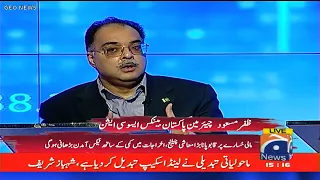Zafar Masud with Shahzeb Khanzada on Great Debate Geo News
On the show ‘Great Debate’ on Geo TV, Zafar Masud with Shahzeb Khanzada on Great Debate Geo News argues that Pakistan’s current account deficit is a symptom of a larger problem – the fiscal deficit. He emphasizes that tackling the government’s spending imbalance is crucial. He also highlights the high domestic consumption that eats into potential export earnings. While acknowledging the need to boost exports, Masud suggests a multi-pronged approach. He advocates for performance-based incentives in key sectors like IT, agriculture, and textiles, alongside addressing the core issue of fiscal discipline. This will diversify exports and create a more sustainable economic foundation.
Zafar Masud with Shahzeb Khanzada Unpacking Pakistan’s Current Account Deficit
The insightful debate on Geo News’ “Great Debate” Zafar Masud with Shahzeb Khanzada tackles a pressing issue plaguing Pakistan’s economy – the ballooning current account deficit. Mr. Zafar Masud sets a sobering tone, acknowledging the lack of immediate fixes. He argues that the current account deficit is merely a symptom of a deeper illness – the fiscal deficit. This imbalance, where government spending outpaces revenue, needs immediate attention.
See also: Fix Fiscal Account to Tame Inflation
He metaphorically calls the fiscal deficit the “low hanging fruit,” a problem demanding immediate focus. Masud employs a relatable proverb to emphasize the importance of tackling the core issue – the fiscal imbalance – before addressing peripheral challenges like the current account deficit.
Mr. Zafar Masud with Shahzeb Khanzada expands on the issue, explaining how fiscal discipline has a domino effect. By addressing the fiscal imbalance, he believes it will have a ripple effect, positively impacting other economic aspects like the current account deficit. He then shifts gears, highlighting another contributing factor – Pakistan’s high domestic consumption relative to its exports. We consume a significant portion (around 93%) of what we produce, leaving less for export-driven income. This essentially means we’re “eating our dollars” before they can be used to generate foreign income.
Khanzada acknowledges the import issue and the critical need to boost exports. However, he warns against a one-size-fits-all approach. Simply promoting exports across all sectors won’t suffice. He highlights the need for a long-term strategy to nurture the IT sector, allowing it to mature into a strong export base. This requires targeted investments and fostering an environment conducive to innovation and growth.
See also: Challenges, Opportunities and Pakistan’s Path Forward
Shifting gears, Zafar Masud with Shahzeb Khanzada introduces potential short-term solutions mentioned by Nasir Jamal. These likely focus on leveraging remittances from overseas Pakistanis and boosting agricultural exports. He underscores the importance of narrowing the import-export gap, citing the current $15 billion deficit as a critical point. A smaller gap would significantly improve Pakistan’s external economic position.
In this debate of Zafar Masud with Shahzeb Khanzada, Masud throws a controversial suggestion into the mix – redirecting energy price subsidies. He proposes taking subsidies currently enjoyed by the agriculture and fertilizer sectors and channeling them towards the textile industry. This, he argues, would incentivize exports and generate much-needed foreign income. While acknowledging potential criticism, he justifies his stance based on the need to prioritize exports. However, he emphasizes that these subsidies should be performance-driven, withdrawn if the government fails to deliver concrete results in terms of increased textile exports.
Masud agrees with the need to support export-oriented industries like textiles. He expands on Khanzada’s point, advocating for a broader approach that goes beyond simply shifting subsidies. He suggests implementing performance-based incentives in IT and agriculture as well. This would ensure that government support translates into tangible export growth across these sectors, diversifying Pakistan’s export base beyond textiles. This diversification is crucial to mitigate risks associated with overdependence on a single industry.
In conclusion of the discussion of Mr. Zafar Masud with Shahzeb Khanzada, Masud reiterates that tackling the fiscal deficit remains the cornerstone of resolving Pakistan’s broader economic challenges. By addressing the root cause, the government can create a more stable economic foundation for long-term growth and a healthier current account balance. This will require a multi-pronged approach, addressing fiscal imbalance, encouraging export-oriented industries through targeted investments and incentives, and potentially streamlining subsidies for maximum impact.
The dialogue of Mr. Zafar Masud with Shahzeb Khanzada on “Great Debate” highlights the complex challenges Pakistan faces, but also underscores the potential for a brighter economic future through strategic interventions and a focus on long-term growth.
